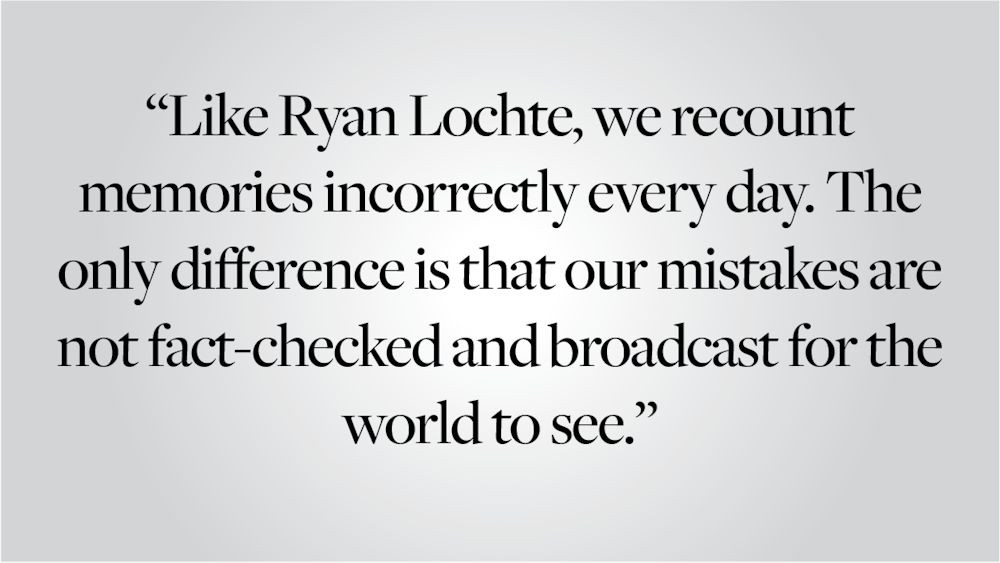During the 2016 Rio Olympics, American swimmers Ryan Lochte, Jimmy Feigen, Jack Conger and Gunnar Bentz were robbed on their way back from a club. Their taxi was pulled over by individuals posing as police officers who ordered the intoxicated swimmers to the ground and stole their wallets. Lochte had a gun pointed at his head. The incident captured global attention, largely due to Lochte's prominence in the swimming world.
But a startling revelation soon emerged: the robbery had actually never occurred. Brazilian authorities, armed with CCTV evidence, claimed that the drunken swimmers had instead vandalized a gas station and fought a security guard. The swimmers’ story was completely fabricated.
Lochte became the subject of widespread ridicule and lost all of his lucrative sponsorships. Some decried him as a symbol of white privilege and American entitlement. He later apologized for the false account.
In an interview four years after the incident, Lochte told a story almost identical to his original fabrication. Without a good reputation to protect or sponsors to retain, Lochte seemingly did not have any reason to lie. In fact, I believe that he genuinely remembered being robbed. Drunk, tired and in a foreign country, Lochte inadvertently constructed a false series of events. He did not deserve the ridicule and vilification he received.
Our memories are startlingly unreliable, especially with the passage of time. In one study, participants were shown videos lacking conclusive “end” scenes. When surveyed just a week later, nearly half of the participants recounted endings that were entirely fictitious. This unreliability even extends to events that seem particularly unforgettable. For instance, most Americans think they can vividly recall where they were when they found out about the 9/11 attacks. Yet studies surveying thousands of people over 10 years proved that this recall was shockingly inaccurate. While people correctly remembered factual details often repeated in the news, their recollections of their emotions or who they were with were frequently flawed and inconsistent. Lochte's recollection of his night in Rio is just as unreliable as those surveyed in these studies. Similar to participants in the “end” scene study, he may have subconsciously added false details to fill gaps in his story. Like Americans recalling 9/11, perhaps Lochte simply forgot important details that, from an outside perspective, should have been unforgettable.
Of course, Lochte’s recall of the “robbery” differed so vastly from reality that it cannot be a product of faulty memory alone. It can, however, be further explained by his drunken state. Drunk memories are incomplete and inaccurate. Alcohol impedes the formation of new memories, an effect that intensifies with increased alcohol consumption. As a result, alcohol-related memory gaps provide fertile ground for the brain to fabricate details to fill in these missing pieces. Consider the case of the novelist Stephen King. In the early 1980s, he was addicted to alcohol (and drugs) to the point that he barely remembers writing the bestselling Cujo. He likely spent hundreds of hours writing this 500-page book, yet cannot recall many of its details accurately no matter how hard he tries. Though Lochte did not drink as much alcohol as King and he was only drunk for one night, he still similarly should not be expected to have an error-free memory of his intoxicated actions.
Lochte’s memory was also likely hampered by the fact that the incident occurred at 4 a.m.. Sleep deprivation impairs our capacity to recall events and inhibits the formation of durable long-term memories. Sleeping less than six hours in one night can impair memory to a significant degree. The consequences of sleep deprivation, such as diminished recall and fragile memory retention, are so severe that they are sometimes mistaken for symptoms of Alzheimer’s disease in older individuals. If Lochte had been sober throughout the whole incident, he still likely would have been too tired to recall it accurately.
While being in a foreign country did not directly impair Lochte's memory, it likely contributed to the overall confusion he experienced due to his intoxicated and fatigued state. The language barrier may have hindered his ability to communicate effectively with individuals at the gas station and law enforcement, leading to potential misunderstandings. Compounding these verbal differences, cultural norms and emotional expressions are not the same in Brazil and the U.S. Subtle cross-country differences like these can lead to disastrous outcomes. For example, while vacationing in Ireland, American actor Matthew Broderick (known for playing Ferris Bueller in “Ferris Bueller's Day Off”) was driving on the wrong side of the road and collided with another vehicle, resulting in the deaths of two individuals.
Though Lochte undoubtedly erred in publicly recounting the incident as he did, he should not have been denounced in the way that he was and he did not deserve to lose his sponsors. At most, he should have been regarded as someone who made a very bad decision and severely lacked self-awareness. Like Ryan Lochte, we recount memories incorrectly every day. The only difference is that our mistakes are not fact-checked and broadcast for the world to see.





